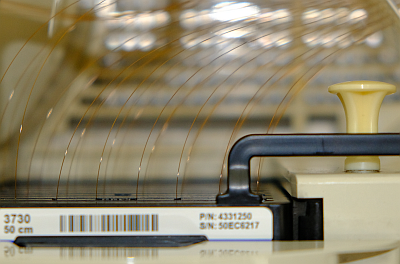Rapid sequencing service for plasmids or PCR fragments with automatic data analysis.
The fastest protocol in our portfolio of Sanger sequencing services. All samples delivered to our laboratory (for all protocols) are processed simultaneously, but samples for the RapidSeq protocol are analyzed preferentially in the sequencers and their results are evaluated automatically. You can expect first results in about 10 hours.
You send us a template that is ready for sequencing (purified).
You supply:
We perform:
|
Sample requirements - RapidSeq (same as StandardSeq protocol) |
Time to results:
What you can expect:
|
 |
The evaluation of results obtained by the RapidSeq protocol takes place without the intervention of human hands. Each result is algorithmically processed immediately after completion of its electrophoresis in the sequencer and automatically sent to clients.
Please note that the electrophoretic separation in sequencers can generate certain errors that cannot be avoided and that typically may require repeating the electrophoresis. At the same time, it may happen that the automatic algorithm evaluates the results suboptimally, even if the electrophoresis is performed correctly. Both cases may require the intervention of our operator, who either subjects such a sample to repeated electrophoresis or adjusts the analysis parameters. However, this intervention by the operator does not occur when sequencing using the RapidSeq protocol.
Examples of these errors (and suboptimal results) are shown here.
The frequency of occurrence of electrophoretic separation errors is approximately 1-2% (one to two samples out of hundred may require repeating the electrophoresis). The frequency of occurrence of suboptimal results of automatic analysis cannot be stated, as it significantly depends on the method of sample preparation and their nature (e.g. GC content, presence of primer dimers, etc.).
We do not repeat electrophoresis of the samples processed by the RapidSeq protocol.